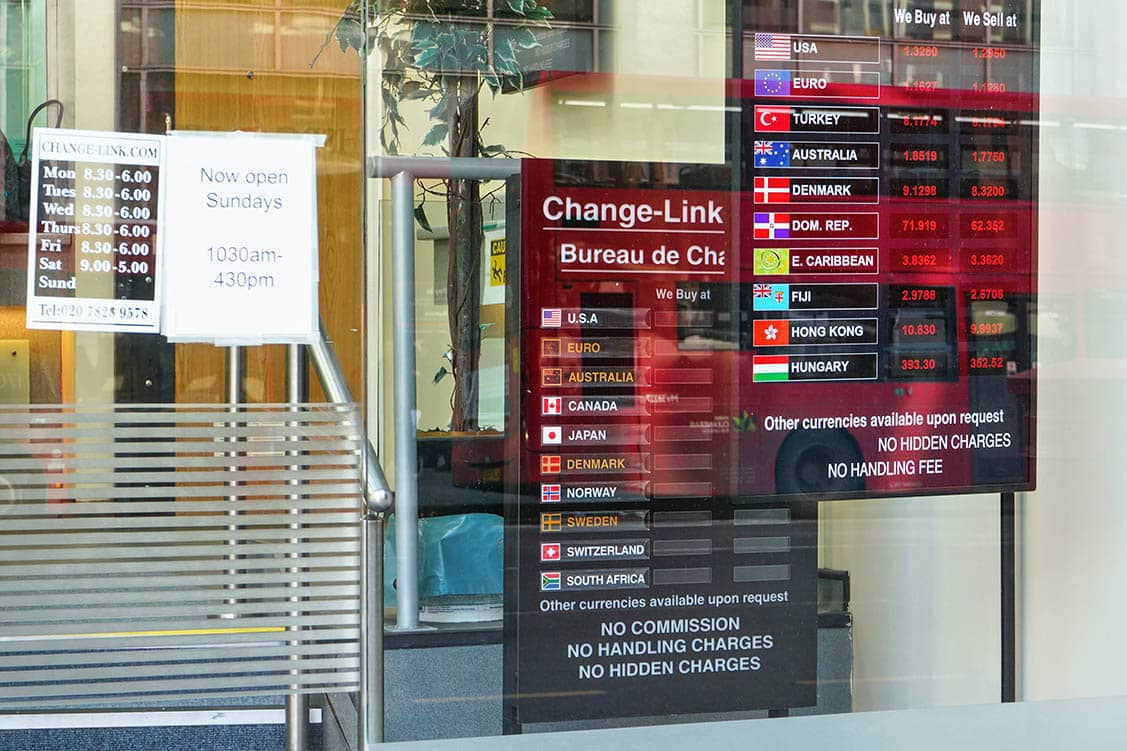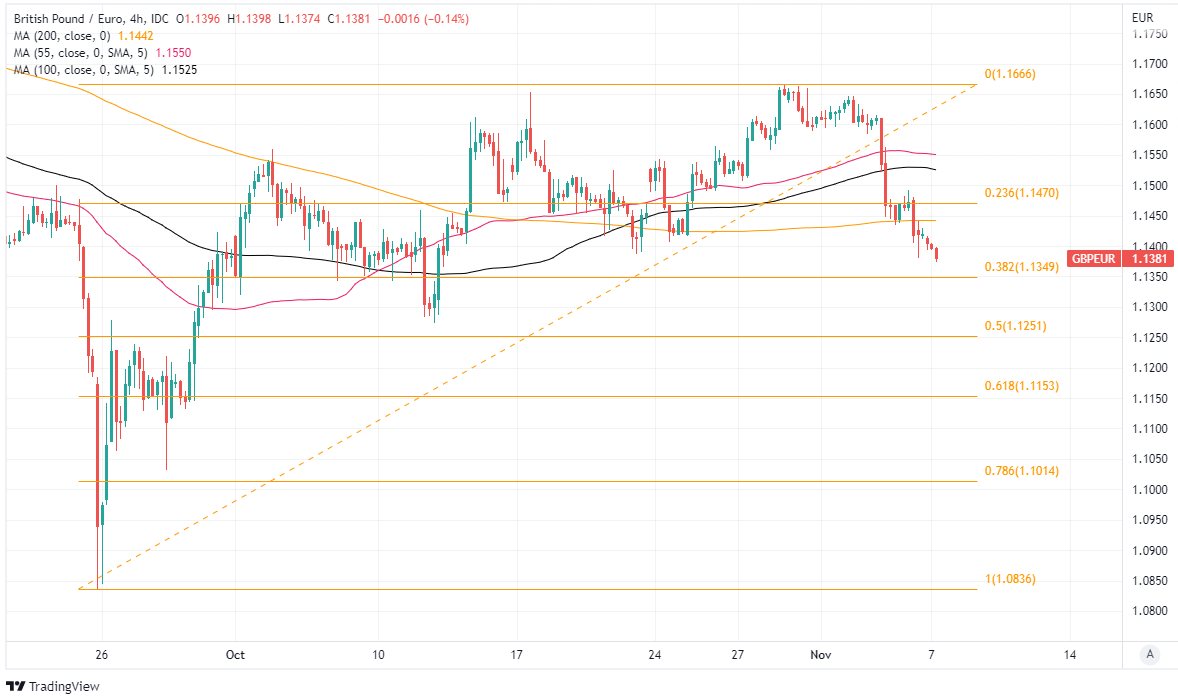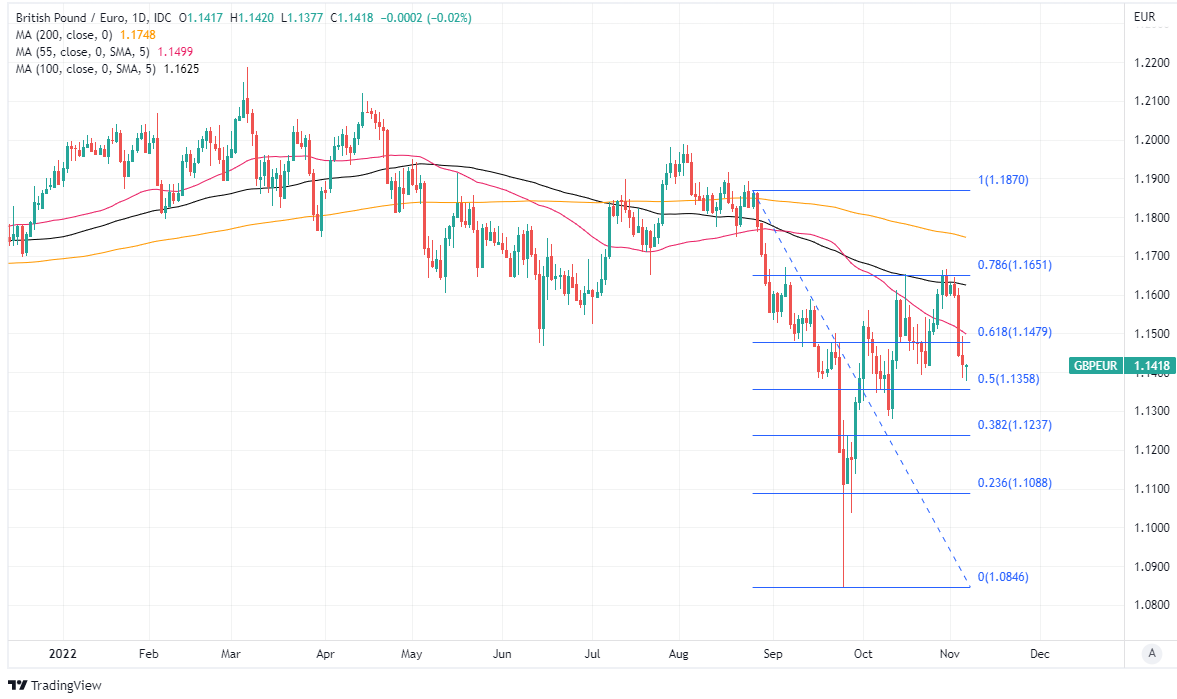GBP/EUR Week Ahead Forecast: Subdued Near to October Lows
- Written by: James Skinner
- GBP/EUR may at risk of further underperformance
- Subdued market appetite & October lows possible
- If BoE rate stance sees market stay leery of GBP
- UK's GDP data & BoE policy implications in focus

Image © Adobe Images
The Pound to Euro exchange rate came undone in heavy losses following November's Bank of England (BoE) interest rate decision but it could be at risk of falling further and back near to early October lows in the days ahead if the market remains leery of Sterling going into Friday's release of UK GDP data.
Sterling sustained heavy losses against most major currencies last week and fell almost two percent against the Euro after the BoE indicated, using its latest forecasts, that it thinks it has likely already done enough with interest rates to ensure that inflation returns to the 2% target in the years ahead.
The BoE also warned explicitly that investors would be mistaken to expect Bank Rate to rise much further from November's newly-increased level of 3% in what was an open confrontation of market wagers that borrowing costs could rise to 4.7% or more in months ahead.
"It is clear, in our view, that the Bank does not believe that more aggressive action is necessary or warranted, and it continues to try to strike an increasingly fine balance between supporting economic activity while still taking some action to resist higher inflation," says Michael Cahill, a strategist at Goldman Sachs.
"As we have discussed previously, this support constitutes a relatively dovish reaction function, which leaves Sterling as an important adjustment mechanism. We continue to think that Sterling should underperform given the difficult external environment and less support from real rates," Cahill and colleagues said on Friday.
 Above: Pound to Euro rate shown at 4-hour intervals with selected moving-averages and Fibonacci retracements of late September recovery indicating possible areas of technical support. To better time your payment requirements, consider setting a free FX rate alert here.
Above: Pound to Euro rate shown at 4-hour intervals with selected moving-averages and Fibonacci retracements of late September recovery indicating possible areas of technical support. To better time your payment requirements, consider setting a free FX rate alert here.
Compare Currency Exchange Rates
Find out how much you could save on your international transfer
Estimated saving compared to high street banks:
£2,500.00
Free • No obligation • Takes 2 minutes
The BoE has raised Bank Rate eight times since last December in an effort to contain an inflation rate that has surged into the double digits following the increases in energy costs stemming from the conflict in Ukraine but November's forecasts indicated clearly that the interest rate cycle may be nearing its end.
This is partly because of the deteriorating state of the economy and is a view that was echoed by Governor Andrew Bailey in last week's press conference, although economists and financial markets have either forecast or wagered that the BoE will have to go further than it has done so far.
This difference of opinion has come at a cost to Sterling and could remain a weight around the ankles of the Pound to Euro rate in the days ahead.
"We believe the pushback was predominantly designed to tame expectation of excessive tightening, rather than squash expectations of hiking," say Fabrice Montagne and Abbas Khan, economists at Barclays.
"With this in mind, we see some upside risks to our baseline expectation of a 50bp hike in December, followed by a status quo (terminal rates at 3.5%), as the MPC may wish to extend the tightening cycle just a bit further, for instance by hiking 25bp in February," they add.
 Above: Pound to Euro rate shown at daily intervals with selected moving-averages and Fibonacci retracements of late August decline indicating possible areas of technical resistance. If you are looking to secure your international payment budget you could consider securing today's rate for use in the future, or set an order for your ideal rate when it is achieved, more information can be found here.
Above: Pound to Euro rate shown at daily intervals with selected moving-averages and Fibonacci retracements of late August decline indicating possible areas of technical resistance. If you are looking to secure your international payment budget you could consider securing today's rate for use in the future, or set an order for your ideal rate when it is achieved, more information can be found here.
While the BoE could yet raise Bank Rate further, its rejection of 'market pricing' for the benchmark to climb toward 5% does keep alive the risk of future market upset and may see investors remain leery of Sterling with potentially suppressive implications for GBP/EUR in the days ahead
One significant motivator of the BoE's reluctance to raise Bank Rate much further has been the deteriorating state of the UK economy, which the bank expects to contract for two years from the final quarter this year as high energy prices and rising interest rates eat into incomes and limit activity.
Hence why the details of the September and third-quarter GDP data due out on Friday will be scrutinised closely for clues on whether the BoE is right to be as pessimistic as it has become on the outlook for the domestic economy, which is widely expected to have contracted -0.4% last quarter.
"We already know that GDP rose a modest 0.1% in July, but then fell 0.3% in August," says Andrew Goodwin, chief UK economist at Oxford Economics.
"The economy is likely to have contracted further in September. Along with still-pressing headwinds from the cost-of-living crisis, output that month will have also been held back by the extra public holiday for the late Queen's state funeral. That meant one fewer working day than normal," Goodwin adds.
Compare Currency Exchange Rates
Find out how much you could save on your international transfer
Estimated saving compared to high street banks:
£2,500.00
Free • No obligation • Takes 2 minutes




